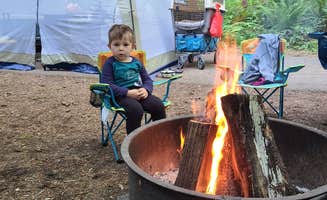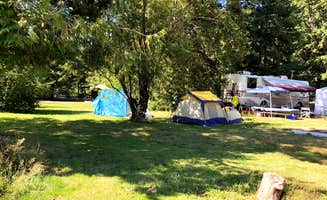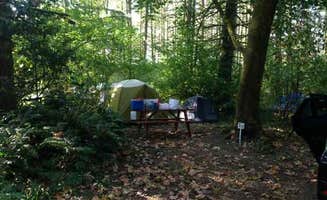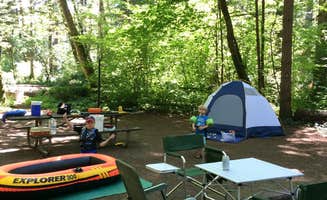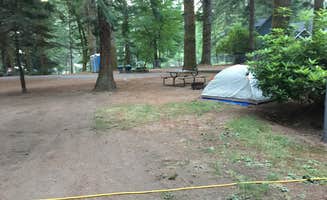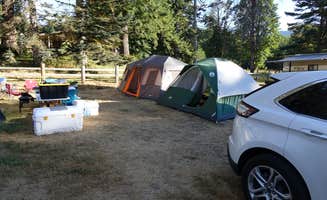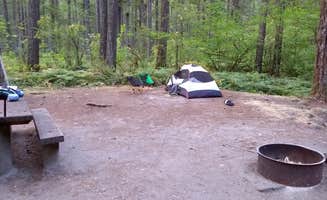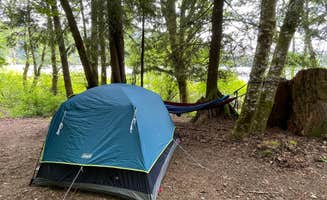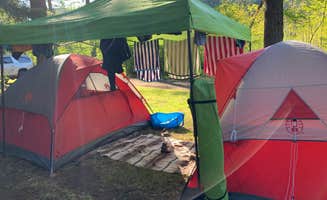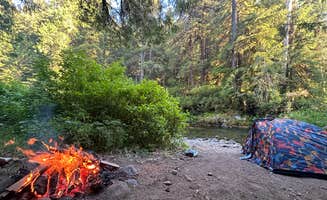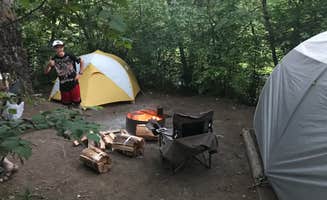The Columbia River Gorge region surrounding Ariel, Washington sits at elevations between 200-1,000 feet, creating distinct microclimates across camping areas. Summer temperatures typically range from 50-85°F with minimal rainfall, while spring and fall camping requires preparation for temperature swings of 30+ degrees within 24 hours. During peak season (June-September), most campsites near Ariel fill by Thursday for weekend stays.
What to do
Waterfall exploration: 1-mile hike required. At Sunset Falls Campground, the waterfall viewing area is accessible via a short, paved trail. "The hike along the river and to the waterfalls is short and offers great swimming and relaxing. Fishing is not permitted on the river that runs through the campground," notes Josh W. Multiple swimming pools form above and below the falls.
Winter camping: Temperatures drop to 30-45°F. Battle Ground Lake State Park Campground remains open year-round with winter camping options. "Rolled in January 1st. Self pay. About 5 sites with power and water. We got a nice level one. There are only 5 other sites in the whole campground occupied. Short walk to the lake to fish. Beautiful and quiet... And 25 degrees," reports Chris J.
Volcanic lake swimming: Clear waters. Battle Ground Lake offers a swimming area with volcanic origins. "They have a cool volcanic lake with a swimming area and great fishing. Its like a mini crater lake. I mean mini like pond size," explains Ashley Y. The lake stays cool even during summer heat waves.
What campers like
Walk-in sites for privacy: Short distance from parking. Beaver Bay Campground offers walk-in options away from the main campground. "The walk-in sites are a very short walk from the parking lot, so unless you need your car or trailer, they're a pretty great way to go," mentions Corinna B. These sites provide increased distance from neighboring campers.
Lakeside access: Yale Lake water activities. Beaver Bay provides direct water access for multiple activities. "It's kept clean and has easy access to Yale Lake for boating, kayaking, paddle boarding and inflatables," reports Steve S. The lake serves as the primary recreation focal point for the campground.
Shaded forest sites: Old-growth canopy. Lewis River Campground Community of Christ offers sites beneath tall trees. "Peaceful setting, room to hike and roam. Across street from east fork of the Lewis River," notes Carrie U. The campground maintains a significant tree canopy throughout the camping areas.
What you should know
Highway noise affects some locations: Variable by campsite. Paradise Point State Park Campground sits near Interstate 5, creating noise challenges. "Great state park with all the usual amenities: fire pits, trees, ranger station. It's basically two different types of campgrounds in one: there's the sites more out in the open that are closer to the freeway. Then there's a bunch further away in both a meadow and the woods. Obviously if possible, stay away from the freeway," advises Brian C.
Limited cell service: Bring offline resources. Most campgrounds in the area have minimal or no cell coverage. "No cell service" is commonly reported at more remote locations, with better coverage at campgrounds closer to towns.
Water quality varies: Bring drinking water. Several campgrounds report water quality issues. At Reeder Beach RV Park, "Water has arsenic and is no good to drink or cook with. You have to bring your own water, or buy theirs, which they don't mention on their website," warns Z R.
Tips for camping with families
Playground access: Available at select campgrounds. Seaquest State Park Campground features play areas for children. "My kids loved the addition of a playground. Many parks dont have this and it kept them entertained for hours. There is a bathroom and extra parking right next to the playground," shares Mary C. The park also offers junior ranger programs.
Swimming safety: Bring flotation devices. Paradise Point State Park provides life jackets for children. "The day use area also provides life jackets if you forget yours," notes Fatima H. Water depth changes suddenly in many swimming areas.
Education opportunities: Ranger programs available. Seaquest State Park offers structured activities for children. "At night the campground had a great Junior Ranger program with a very enthusiastic park ranger that kept the almost 50 people/kids entertained. She was great at engaging all the kids and teaching them about the park, highly recommend this for anyone bringing kids," recommends Ashley B.
Tips from RVers
Site limitations: Check length restrictions carefully. Many campgrounds have tree-lined roads making navigation challenging. "We arrived and it was IMPOSSIBLE to get our rig in that site due to the trees. We couldn't even continue out the secondary loop because it was so narrow and had trees on the inside of turns," reports Alex W. about Paradise Point State Park. Sites that accommodate larger RVs are limited in the region.
Dump station availability: Plan accordingly. Cougar Park & Campground provides shower facilities but lacks a dump station. "Nice bathrooms with wonderful shower, which we love after the climb," mentions Charyl B. Many campgrounds charge additional fees for dump station use.
Power options: Limited full hookups. Electric service varies widely between campgrounds with most offering 30-amp service when available. Complete hookups are rare at forest service and more primitive camping areas.


